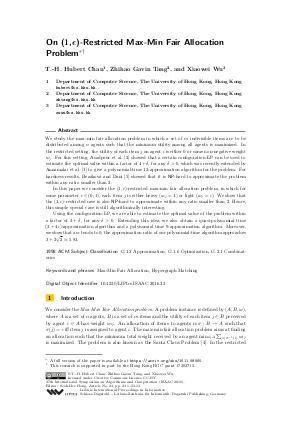On (1, epsilon)-Restricted Max-Min Fair Allocation Problem
Authors T-H. Hubert Chan, Zhihao Gavin Tang, Xiaowei Wu
-
Part of:
Volume:
27th International Symposium on Algorithms and Computation (ISAAC 2016)
Part of: Series: Leibniz International Proceedings in Informatics (LIPIcs)
Part of: Conference: International Symposium on Algorithms and Computation (ISAAC) - License:
 Creative Commons Attribution 3.0 Unported license
Creative Commons Attribution 3.0 Unported license
- Publication Date: 2016-12-07
File

PDF
LIPIcs.ISAAC.2016.23.pdf
- Filesize: 0.54 MB
- 13 pages
Document Identifiers
Subject Classification
Keywords
- Max-Min Fair Allocation
- Hypergraph Matching
Metrics
- Access Statistics
-
Total Accesses (updated on a weekly basis)
0Document
0Metadata
Abstract
We study the max-min fair allocation problem in which a set of m indivisible items are to be distributed among n agents such that the minimum utility among all agents is maximized. In the restricted setting, the utility of each item j on agent i is either 0 or some non-negative weight w_j. For this setting, Asadpour et al. [TALG, 2012] showed that a certain configuration-LP can be used to estimate the optimal value within a factor of 4 + delta, for any delta > 0, which was recently extended by Annamalai et al. [SODA 2015] to give a polynomial-time 13-approximation algorithm for the problem. For hardness results, Bezáková and Dani [SIGecom Exch., 2005] showed that it is NP-hard to approximate the problem within any ratio smaller than 2.
In this paper we consider the (1, epsilon)-restricted max-min fair allocation problem, in which for some parameter epsilon in (0, 1), each item j is either heavy (w_j = 1) or light (w_j = epsilon). We show that the (1, epsilon)-restricted case is also NP-hard to approximate within any ratio smaller than 2. Hence, this simple special case is still algorithmically interesting.
Using the configuration-LP, we are able to estimate the optimal value of the problem within a factor of 3 + delta, for any delta > 0. Extending this idea, we also obtain a quasi-polynomial time (3 + 4 epsilon)-approximation algorithm and a polynomial time 9-approximation algorithm. Moreover, we show that as epsilon tends to 0, the approximation ratio of our polynomial-time algorithm approaches 3 + 2 sqrt{2} approx 5.83.
Cite As Get BibTex
T-H. Hubert Chan, Zhihao Gavin Tang, and Xiaowei Wu. On (1, epsilon)-Restricted Max-Min Fair Allocation Problem. In 27th International Symposium on Algorithms and Computation (ISAAC 2016). Leibniz International Proceedings in Informatics (LIPIcs), Volume 64, pp. 23:1-23:13, Schloss Dagstuhl – Leibniz-Zentrum für Informatik (2016)
https://doi.org/10.4230/LIPIcs.ISAAC.2016.23
BibTex
@InProceedings{chan_et_al:LIPIcs.ISAAC.2016.23,
author = {Chan, T-H. Hubert and Tang, Zhihao Gavin and Wu, Xiaowei},
title = {{On (1, epsilon)-Restricted Max-Min Fair Allocation Problem}},
booktitle = {27th International Symposium on Algorithms and Computation (ISAAC 2016)},
pages = {23:1--23:13},
series = {Leibniz International Proceedings in Informatics (LIPIcs)},
ISBN = {978-3-95977-026-2},
ISSN = {1868-8969},
year = {2016},
volume = {64},
editor = {Hong, Seok-Hee},
publisher = {Schloss Dagstuhl -- Leibniz-Zentrum f{\"u}r Informatik},
address = {Dagstuhl, Germany},
URL = {https://drops.dagstuhl.de/entities/document/10.4230/LIPIcs.ISAAC.2016.23},
URN = {urn:nbn:de:0030-drops-67939},
doi = {10.4230/LIPIcs.ISAAC.2016.23},
annote = {Keywords: Max-Min Fair Allocation, Hypergraph Matching}
}
Author Details
References
- Chidambaram Annamalai, Christos Kalaitzis, and Ola Svensson. Combinatorial algorithm for restricted max-min fair allocation. In Piotr Indyk, editor, SODA 2015, San Diego, CA, USA, January 4-6, 2015, pages 1357-1372. SIAM, 2015. URL: http://dx.doi.org/10.1137/1.9781611973730.90.
- Arash Asadpour, Uriel Feige, and Amin Saberi. Santa claus meets hypergraph matchings. ACM Transactions on Algorithms, 8(3):24, 2012. URL: http://dx.doi.org/10.1145/2229163.2229168.
- Arash Asadpour and Amin Saberi. An approximation algorithm for max-min fair allocation of indivisible goods. In David S. Johnson and Uriel Feige, editors, STOC 2007, San Diego, California, USA, June 11-13, 2007, pages 114-121. ACM, 2007. URL: http://dx.doi.org/10.1145/1250790.1250808.
- Nikhil Bansal and Maxim Sviridenko. The santa claus problem. In Jon M. Kleinberg, editor, STOC 2006, Seattle, WA, USA, May 21-23, 2006, pages 31-40. ACM, 2006. URL: http://dx.doi.org/10.1145/1132516.1132522.
- Ivona Bezáková and Varsha Dani. Allocating indivisible goods. SIGecom Exchanges, 5(3):11-18, 2005. URL: http://dx.doi.org/10.1145/1120680.1120683.
- Deeparnab Chakrabarty, Julia Chuzhoy, and Sanjeev Khanna. On allocating goods to maximize fairness. In FOCS 2009, October 25-27, 2009, Atlanta, Georgia, USA, pages 107-116. IEEE Computer Society, 2009. URL: http://dx.doi.org/10.1109/FOCS.2009.51.
- Deeparnab Chakrabarty, Sanjeev Khanna, and Shi Li. On (1, epsilon)-restricted assignment makespan minimization. In Piotr Indyk, editor, SODA 2015, San Diego, CA, USA, January 4-6, 2015, pages 1087-1101. SIAM, 2015. URL: http://dx.doi.org/10.1137/1.9781611973730.73.
- Uriel Feige. On allocations that maximize fairness. In Shang-Hua Teng, editor, SODA 2008, San Francisco, California, USA, January 20-22, 2008, pages 287-293. SIAM, 2008. URL: http://dl.acm.org/citation.cfm?id=1347082.1347114.
- Michel X. Goemans, Nicholas J. A. Harvey, Satoru Iwata, and Vahab S. Mirrokni. Approximating submodular functions everywhere. In Claire Mathieu, editor, SODA 2009, New York, NY, USA, January 4-6, 2009, pages 535-544. SIAM, 2009. URL: http://dl.acm.org/citation.cfm?id=1496770.1496829.
-
Daniel Golovin. Max-min fair allocation of indivisible goods. Technical report, Carnegie Mellon University, 2005.

- Bernhard Haeupler, Barna Saha, and Aravind Srinivasan. New constructive aspects of the lovasz local lemma. In FOCS 2010, October 23-26, 2010, Las Vegas, Nevada, USA, pages 397-406. IEEE Computer Society, 2010. URL: http://dx.doi.org/10.1109/FOCS.2010.45.
- Penny E. Haxell. A condition for matchability in hypergraphs. Graphs and Combinatorics, 11(3):245-248, 1995. URL: http://dx.doi.org/10.1007/BF01793010.
-
Subhash Khot and Ashok Kumar Ponnuswami. Approximation algorithms for the max-min allocation problem. In APPROX-RANDOM, volume 4627 of Lecture Notes in Computer Science, pages 204-217. Springer, 2007.

- Jan Karel Lenstra, David B. Shmoys, and Éva Tardos. Approximation algorithms for scheduling unrelated parallel machines. Math. Program., 46:259-271, 1990. URL: http://dx.doi.org/10.1007/BF01585745.
-
Lukas Polacek and Ola Svensson. Quasi-polynomial local search for restricted max-min fair allocation. In ICALP (1), volume 7391 of Lecture Notes in Computer Science, pages 726-737. Springer, 2012.

- Ola Svensson. Santa claus schedules jobs on unrelated machines. In Lance Fortnow and Salil P. Vadhan, editors, STOC 2011, San Jose, CA, USA, 6-8 June 2011, pages 617-626. ACM, 2011. URL: http://dx.doi.org/10.1145/1993636.1993718.
